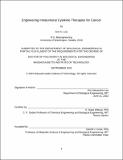Engineering Intratumoral Cytokine Therapies for Cancer
Author(s)
Lutz, Emi A.
DownloadThesis PDF (6.508Mb)
Advisor
Wittrup, K. Dane
Terms of use
Metadata
Show full item recordAbstract
Immunotherapies enable effective, long-lasting anti-tumor immunity for some cancer patients. Cytokines are key signaling proteins that help activate and sustain critical immune cells during this process. Unfortunately, traditional cytokine therapies suffer from low efficacy and high systemic toxicity. As one strategy to improve therapeutic index, intratumorally administered and retained cytokines have been demonstrated to improve both safety and efficacy. However, further research on intratumoral cytokine therapies is needed to uncover optimal design strategies and considerations when eliciting strong, localized cytokine exposure. Towards this goal, we first test if intratumoral administration and retention is an effective strategy for type I interferons (IFN). Significant enhancement in tumor retention of IFN and IFN, mediated by anchoring these IFNs to co-injected aluminum-hydroxide (alum) particles, greatly improved their tolerability and efficacy. The improved efficacy of alum-anchored IFNs could be attributed to sustained pleiotropic effects on tumor cells, immune cells, and non-hematopoietic cells. Alum-anchored IFN therapies were curative upon combination with either anti-PD-1 or interleukin-2 (IL-2). However, only the anti-PD-1 combination led to protection against tumor rechallenge, demonstrating that overstimulation of cytokine signaling can dampen memory response. Second, we research design criteria for intratumorally administered IL-2 fused to tumor-specific nanobodies. Using yeast surface display, we develop IL-2 fusions with a range of affinities to the tumor-specific EIIIB domain of fibronectin. Such IL-2 fusions enabled strong anti-tumor efficacy, provided both intratumoral administration and sufficient affinity to EIIIB. Third, we explore intratumoral therapies that activate the cGAS-STING pathway, which leads to type I IFN production. Specifically, we design DNA-based agonists of cGAS that delay tumor growth in mice. Together, this thesis furthers our understanding of how to effectively elicit localized cytokine responses at the tumor for cancer immunotherapy.
Date issued
2022-09Department
Massachusetts Institute of Technology. Department of Biological EngineeringPublisher
Massachusetts Institute of Technology